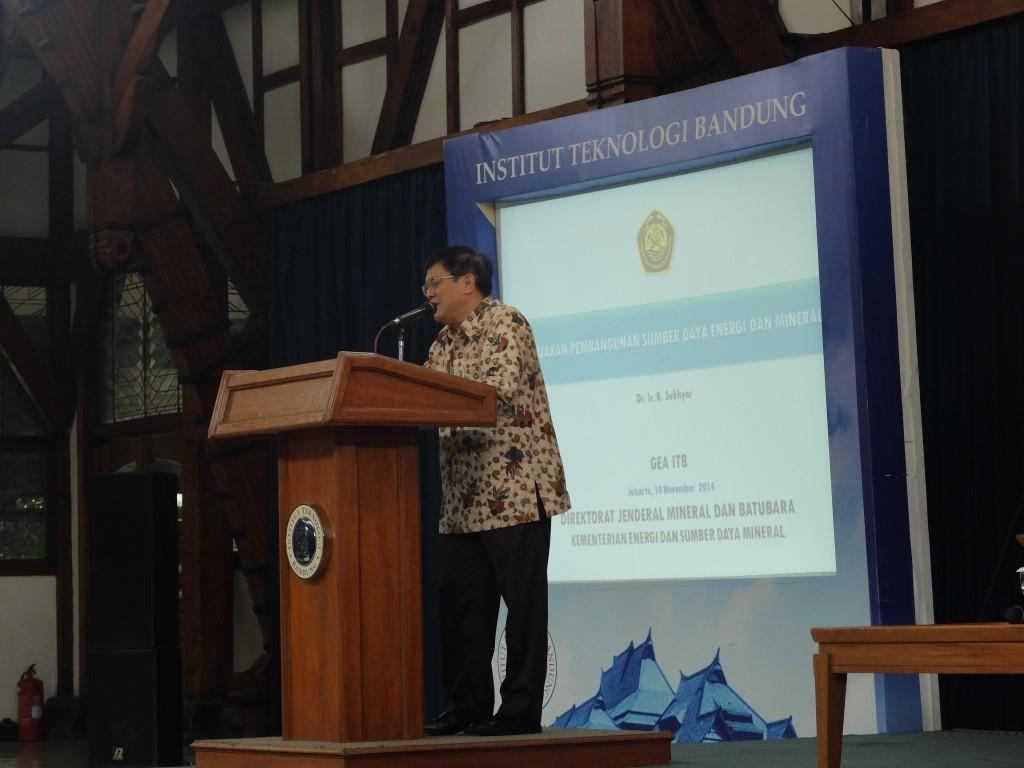Indonesia Can Reach Mineral Resistance Only If We Change Our Paradigm
By Teguh Yassi Akasyah
Editor Teguh Yassi Akasyah

 BANDUNG, itb.ac.id - Indonesian coal and mineral wealth so far only seen as a resource to be exploited, not explored. Continuous exploitation takes place resulting in a drop of mineral and coal reserves owned by Indonesia. In fact, the reserves are not supposed to go down. This raises doubts about the sovereignty of the resource. Especially in the country's efforts to incorporate policies in its management. Through Studium Generale on Wednesday (12/11/14) in the West Hall, ITB opening insights about the sovereignty of mineral and coal resources in Indonesia. This public lecture invited Dr. Ir. R. Sukhyar, Director General of Mineral and Coal, as a speaker with the topic 'Development Policy Minerals and Coal Indonesia'.
BANDUNG, itb.ac.id - Indonesian coal and mineral wealth so far only seen as a resource to be exploited, not explored. Continuous exploitation takes place resulting in a drop of mineral and coal reserves owned by Indonesia. In fact, the reserves are not supposed to go down. This raises doubts about the sovereignty of the resource. Especially in the country's efforts to incorporate policies in its management. Through Studium Generale on Wednesday (12/11/14) in the West Hall, ITB opening insights about the sovereignty of mineral and coal resources in Indonesia. This public lecture invited Dr. Ir. R. Sukhyar, Director General of Mineral and Coal, as a speaker with the topic 'Development Policy Minerals and Coal Indonesia'. According Sukhyar, there is no country that does not depart from natural resources. Natural resources are used as a basis in the development of the manufacturing industry in developed countries. "The important thing is how the resource exploration results can improve the quality of human resources, including improving education for advancement," said Sukhyar in his presentation. Indonesia's mineral wealth makes the world depends on it. Indonesia as a lead supplier number one in the world. Approximately 70% -80% lead the world comes from Indonesia. Moreover, in Japan using nickel as much as 40% from Indonesia. However, Indonesia is only sending raw items. In this case, the addition of value to these resources is very important for Indonesia and generate more profitable natural resource sovereignty.
 Speaking of endurance, national natural resources must be started from sovereignty. The essence of the most important is the determination of the direction of development by our own people who are able to give maximum benefit to the community. Then progressed to the stage of self-sufficiency, which is able to manage and cultivate their own natural resources. This independence, according Sukhyar will create individuals who are competent, innovative, and competitive and able to compete with other countries. Then Indonesia will be referred to as countries with high resilience if the assured supply of energy or minerals in a sustainable manner for the people. And bending of the external and domestic shocks. With the sovereignty, the people and the industry will gain energy or minerals at affordable prices and safe.
Speaking of endurance, national natural resources must be started from sovereignty. The essence of the most important is the determination of the direction of development by our own people who are able to give maximum benefit to the community. Then progressed to the stage of self-sufficiency, which is able to manage and cultivate their own natural resources. This independence, according Sukhyar will create individuals who are competent, innovative, and competitive and able to compete with other countries. Then Indonesia will be referred to as countries with high resilience if the assured supply of energy or minerals in a sustainable manner for the people. And bending of the external and domestic shocks. With the sovereignty, the people and the industry will gain energy or minerals at affordable prices and safe.
"To achieve the sovereignty, we must change the paradigm of exploitation into exploration," said Sukhyar. For him, the old paradigm that exploit natural resources to receive as much revenue needs to be changed to a new paradigm. The new paradigm is focused resources used as sustainable development. In this case, the resource management is needed.
Indonesia Current conditions
Now there are three mining exploitation pattern applied in Indonesia. First, cooperation contracts (KKS) for the oil and gas sector with its production split between the government and the company. 90-10 to 70-30 for the petroleum and natural gas. Now there have been 321 Working Area for KKS. Second, concessions for minerals and coal. In this form, the company pays royalties on minerals for sale. The company pays taxes from their sales. There are 34 contracts for works and 73 contract for Coal Mining Agreement (PKP2B). Third is the Service Agreement, the company doing the work that paid in accordance with an agreement with the company holder of mining rights over their work. Based on the production process over the years, Indonesia has exported crude oil, natural gas, coal, and mineral types. But also still importing crude oil, fuel oil, LPG, and some minerals because not all of the specifications of domestic refineries can process of national oil production.
Indonesia also began directing energy conservation policies to improve energy efficiency in the supply and utilization in terms of demand such as industry, transport, household, and commercial. Another policy is the diversification of energy to increase the share of renewable energy (EBT) in the national energy. Currently, the use of oil as much as 49.7%, 20.1% Gas, Coal 24.6% and 5.7% for new renewable energy. In 2025 the targeted use of oil decreased to 25% and transferred to the use of renewable energy to reach 23%. Targeted use of gas by 22% and 30% coal.
Sukhyar also revealed that efforts need to be made by the various parties. For him, the government needs to do a preliminary exploration such as seismic surveys and detailed geoscience studies that can assist in the production process of the working area. In addition, the government should also encourage businesses to conduct oil and gas exploration, especially drilling. "Ofcourse, the process must go on and escorted to increase the added value of mineral and coal as well as developing the resource-based manufacturing industries," concludes Sukhyar.

.jpg)
.jpg)
.jpg)
.jpg)
.jpg)



